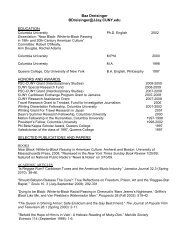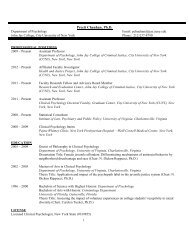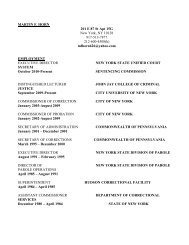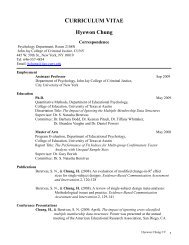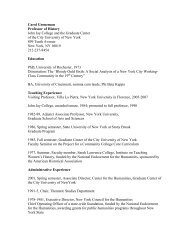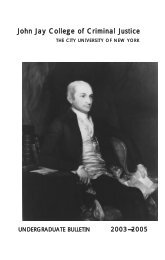Bulletin - John Jay College Of Criminal Justice - CUNY
Bulletin - John Jay College Of Criminal Justice - CUNY
Bulletin - John Jay College Of Criminal Justice - CUNY
Create successful ePaper yourself
Turn your PDF publications into a flip-book with our unique Google optimized e-Paper software.
Courses <strong>Of</strong>fered<br />
LAW 245 Immigration Law<br />
(Same course as GOV 245 and POL 245)<br />
3 hours, 3 credits<br />
A survey of the administration of immigration law; this course<br />
examines the history of American immigration law in brief, surveys<br />
the current statutes, and details the administrative and judicial<br />
practices of relevant agencies and jurisdictions.<br />
Prerequisites: ENG 101, Law 203 or 206, and PAD 240<br />
LAW 310 Ethics and Law<br />
(Same course as PHI 310)<br />
3 hours, 3 credits<br />
Inquiry into the relationship between morality and law; their organic<br />
interrelationship in the natural law tradition; their separation in<br />
positivism. The contemporary debate illustrated by the issues of<br />
human and civil rights; the enforcement of sexual morality; civil<br />
disobedience and the ethics of law enforcement.<br />
Prerequisites: ENG 102 or ENG 201, and PHI 231<br />
LAW 259 Comparative <strong>Criminal</strong> <strong>Justice</strong> Systems<br />
(Same course as GOV 259 and POL 259)<br />
3 hours, 3 credits<br />
Study of the variations in patterns of corruption and political crimes<br />
as well as patterns of law enforcement and adjudication among<br />
political systems. Examples are drawn from a variety of political<br />
systems: democratic, communist and modernizing.<br />
Prerequisites: ENG 101, and GOV 101 or POL 101 or permission of<br />
the section instructor<br />
LAW 301 Jurisprudence<br />
3 hours, 3 credits<br />
This course considers the study of the theory and philosophy of law<br />
and the relationship between law and society. Issues to which special<br />
attention will be paid include the problem of disobedience, the nature<br />
of the judicial process, and the relations between law and personal<br />
morality. Current controversies about civil disobedience, the role of<br />
courts, “non-victim” crimes and the relationship of the police to the<br />
rule of law will be explored.<br />
Prerequisites: ENG 102 or ENG 201, LAW 203 or GOV 230 or POL<br />
230, and junior standing or above<br />
LAW 313 The Law and Politics of Race Relations<br />
(Same course as GOV 313 and POL 313)<br />
3 hours, 3 credits<br />
Analysis of the politics of race and racism in the United States<br />
through the examination of major court decisions and of legislations<br />
affecting minority groups. Treatment of racial minority groups in the<br />
criminal and civil justice systems, and by courts, police and prisons<br />
will be included.<br />
Prerequisites: ENG 102 or ENG 201, GOV 101 or POL 101, and<br />
junior standing or above, or permission of the section instructor<br />
LAW 319 The Death Penalty<br />
3 hours, 3 credits<br />
This is a study of the death penalty as practiced in the United States.<br />
Among other issues, the course examines the morality of the death<br />
penalty, constitutional limitations on the types of crimes and<br />
criminals for which the death penalty is appropriate, and procedural<br />
restrictions on the death sentencing process including jury selection<br />
and the performance of counsel. This is a writing-intensive course,<br />
with an emphasis on developing written and spoken critical reasoning<br />
skills. The course relies extensively on the case study method, using<br />
major Supreme Court decisions both to teach legal doctrine and to<br />
highlight moral and ethical issues.<br />
Prerequisites: ENG 102 or ENG 201, and GOV 202 or POL 202 or<br />
LAW 303<br />
106



